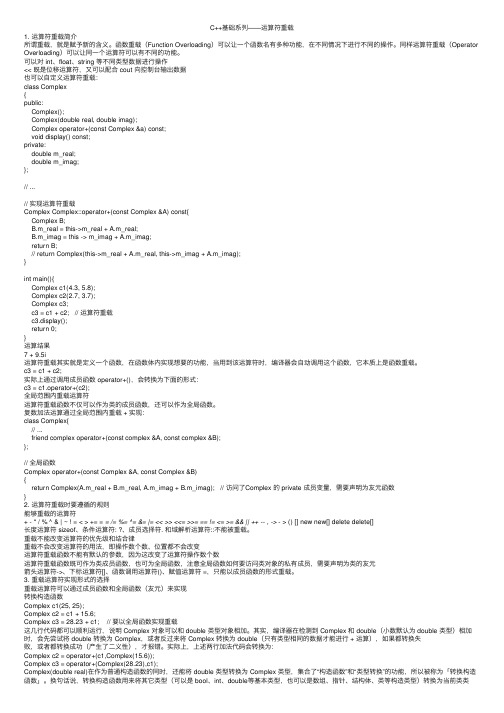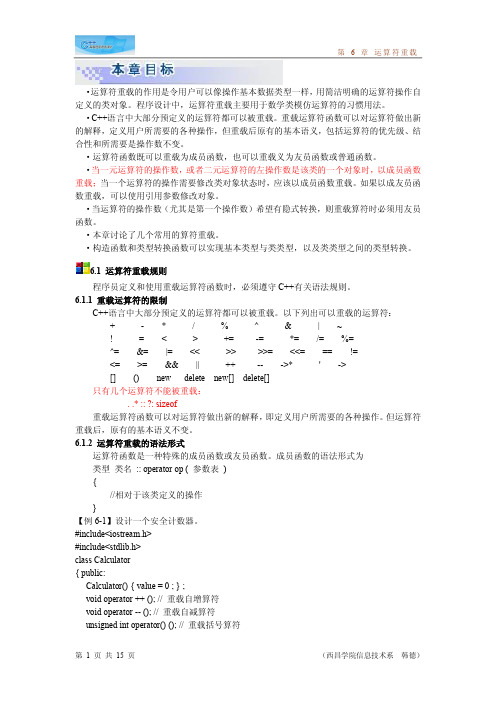重载箭头运算符
- 格式:doc
- 大小:12.14 KB
- 文档页数:1

C++基础系列——运算符重载1. 运算符重载简介所谓重载,就是赋予新的含义。
函数重载(Function Overloading)可以让⼀个函数名有多种功能,在不同情况下进⾏不同的操作。
同样运算符重载(Operator Overloading)可以让同⼀个运算符可以有不同的功能。
可以对 int、float、string 等不同类型数据进⾏操作<< 既是位移运算符,⼜可以配合 cout 向控制台输出数据也可以⾃定义运算符重载:class Complex{public:Complex();Complex(double real, double imag);Complex operator+(const Complex &a) const;void display() const;private:double m_real;double m_imag;};// ...// 实现运算符重载Complex Complex::operator+(const Complex &A) const{Complex B;B.m_real = this->m_real + A.m_real;B.m_imag = this -> m_imag + A.m_imag;return B;// return Complex(this->m_real + A.m_real, this->m_imag + A.m_imag);}int main(){Complex c1(4.3, 5.8);Complex c2(2.7, 3.7);Complex c3;c3 = c1 + c2; // 运算符重载c3.display();return 0;}运算结果7 + 9.5i运算符重载其实就是定义⼀个函数,在函数体内实现想要的功能,当⽤到该运算符时,编译器会⾃动调⽤这个函数,它本质上是函数重载。



可以重载的运算符随着程序设计语言的发展,越来越多的重载运算符的机会出现。
通过重载运算符,可以方便地对自定义类型进行操作,并提高代码的可读性和可维护性。
以下是一些可以重载的运算符:1. 一元运算符:重载一元运算符可以改变一个对象的状态或值。
常见的一元运算符包括:+(正号)、-(负号)、*(指针)、&(取地址符)、~(按位取反)等。
2. 二元运算符:重载二元运算符可以改变两个对象之间的运算方式。
常见的二元运算符包括:+(加号)、-(减号)、*(乘号)、/(除号)等。
在C++中,还可以重载操作符用于比较操作,如==、!=、<=、>=等。
3. 赋值运算符:重载赋值运算符可以对自定义类型进行赋值操作。
默认的赋值运算符只是简单地复制对象的值,而且会存在浅拷贝和深拷贝的问题。
4. 下标运算符:重载下标运算符可以通过对象数组形式来访问对象中的元素。
这种运算符对于自定义容器和数据结构非常有用。
5. 函数调用运算符:重载函数调用运算符可以让对象具有函数行为。
通过这种方式,可以实现自定义类型的函数调用和参数传递。
6. 前置/后置增量运算符:重载前置/后置增量运算符可以使得对象的值增加或减少。
前置增量运算符在对象的值被使用之前首先递增对象的值,而后置增量运算符在对象的值被使用后递增对象的值。
7. 强制类型转换运算符:重载强制类型转换运算符可以将自定义类型转换为其他数据类型,例如将一个类的对象转换为bool值或整数值等。
通过重载运算符,可以轻松地实现自定义类型的强类型检查和操作。
但是,在重载运算符时应该注意保持一致性和正确性,以确保代码的正确性和可维护性。


operator重载运算符的理解英文版Understanding the Overloading of the Operator in C++In the realm of programming, operators are symbols that perform specific tasks on data. In C++, these operators can be overloaded, meaning their default behavior can be altered to perform user-defined operations. This flexibility adds a significant amount of power to the language, enabling developers to create more intuitive and user-friendly interfaces.What is Operator Overloading?Operator overloading is a concept in C++ that allows programmers to redefine the behavior of existing operators for user-defined types. This means that you can create a class and define how operators like +, -, *, /, ==, etc., behave when applied to objects of that class.Why Use Operator Overloading?Operator overloading is useful in several scenarios. Here are a few reasons why you might want to overload an operator:Intuitiveness: It allows objects to behave like built-in types, making code more readable and intuitive.Convenience: It removes the need to create separate functions for every operation, simplifying code.Encapsulation: It hides the implementation details of a class, providing a cleaner and more abstracted interface.How to Overload Operators?Operator overloading in C++ is done by defining a function within a class that has the same name as the operator you want to overload. Here's a simple example of how to overload the + operator for a custom class ComplexNumber:cppCopy class ComplexNumber {private:double real;double imag;public:ComplexNumber(double r, double i) : real(r), imag(i) {} // Overload the + operatorComplexNumber operator+(const ComplexNumber& other) {return ComplexNumber(real + other.real, imag + other.imag);}// Other member functions and operators...};class ComplexNumber {private:double real;double imag;public:ComplexNumber(double r, double i) : real(r), imag(i) {} // Overload the + operatorComplexNumber operator+(const ComplexNumber& other) {return ComplexNumber(real + other.real, imag + other.imag);}// Other member functions and operators...};In this example, the + operator is overloaded to add two ComplexNumber objects together, component-wise.Best Practices and ConsiderationsWhen overloading operators, there are a few best practices and considerations to keep in mind:Consistency: Ensure that the overloaded operator behaves consistently with its default behavior and with other overloaded operators.Intuitive Naming: Use operator names that are intuitive and consistent with the language's syntax.Avoid Overuse: Don't overuse operator overloading. It should be done sparingly and only when it adds clarity and convenience.Documentation: Provide clear documentation explaining the behavior of overloaded operators.ConclusionOperator overloading is a powerful feature of C++ that allows developers to create more intuitive and user-friendly interfaces. However, it should be used judiciously, following best practices to ensure code clarity and maintainability. By understanding the concepts and considerations behind operator overloading, you can harness its power to create more expressive and efficient code.中文版理解C++中的运算符重载在编程领域,运算符是对数据执行特定任务的符号。
c++结构体重载运算符C++结构体可以通过重载运算符来实现自定义的操作符行为。
重载运算符允许我们使用结构体对象与其他对象之间进行类似于内置数据类型的操作。
下面将介绍一些常用的运算符重载的方式以及其使用场景。
1. 算术运算符重载:- 重载+运算符:可以用于结构体对象之间的相加操作。
- 重载-运算符:可以用于结构体对象之间的相减操作。
- 重载*运算符:可以用于结构体对象与标量之间的乘法运算。
- 重载/运算符:可以用于结构体对象与标量之间的除法运算。
2. 关系运算符重载:- 重载==运算符:用于比较两个结构体对象是否相等。
- 重载!=运算符:用于比较两个结构体对象是否不相等。
- 重载<运算符:用于比较两个结构体对象的大小关系。
- 重载>运算符:用于比较两个结构体对象的大小关系。
- 重载<=运算符:用于比较两个结构体对象的大小关系。
- 重载>=运算符:用于比较两个结构体对象的大小关系。
3. 赋值运算符重载:- 重载=运算符:用于将一个结构体对象的值赋给另一个对象。
- 重载+=运算符:用于将一个结构体对象与另一个对象相加,并将结果赋给第一个对象。
- 重载-=运算符:用于将一个结构体对象与另一个对象相减,并将结果赋给第一个对象。
- 重载*=运算符:用于将一个结构体对象与标量相乘,并将结果赋给第一个对象。
- 重载/=运算符:用于将一个结构体对象与标量相除,并将结果赋给第一个对象。
4. 输入输出运算符重载:- 重载<<运算符:用于将结构体对象的数据输出到标准输出流。
- 重载>>运算符:用于从标准输入流中读取数据,并赋给结构体对象的成员变量。
运算符重载的基本语法如下:```返回类型 operator运算符(参数列表) {// 重载运算符的实现代码// 可以直接访问结构体对象的成员变量// 可以调用结构体对象的方法// 可以与其他对象进行运算// 返回运算结果}```在进行运算符重载时,需要注意以下几点:- 重载运算符必须是成员函数或友元函数。
C++运算符重载三种形式(成员函数,友元函数,普通函数)详解三种重载⽅式⾸先,介绍三种重载⽅式:1//作为成员函数重载(常见)2class Person{3 Private:4string name;5int age;6public:7 Person(const char* name, int age):name(name),age(age){}8bool operator<(const Person& b);910 };11bool Person::operator<(const Person& b)12 {13//作为成员函数时,*this即为左操作数a14 ...15 }1//作为友元函数重载2class Person{3private:4string name;5int age;6public:7 Person(const char* name, int age):name(name),age(age){}8 friend bool operator<(const Person& a,const Person& b);910 };11bool operator<(const Person& a,const Person& b)12 {13 ...14 }1//作为普通函数重载(不推荐)2class Person{3public://注意,重载运算符为普通函数时,使⽤到的类成员必须为public4string name;5int age;6public:7 Person(const char* name, int age):name(name),age(age){}89 };10bool operator<(const Person& a,const Person& b)11 {12 ...13 }作为成员函数重载先介绍第⼀种:bool Person::operator<(const Person& b),bool是函数返回类型,Person::只是指定了成员函数所属类名。
重载箭头运算符
重载箭头运算符是C++中用于访问类的成员函数或成员变量的一种运算符。
通过重载箭头运算符,可以实现对复杂数据类型(如链表、树等)的直接访问,使得代码更加简洁易读。
在重载箭头运算符时,需要定义一个返回指针的成员函数,并将该函数定义为类的友元函数,以便访问类的私有成员。
在函数体内,可以使用箭头运算符(->)来访问类的成员函数或成员变量。
需要注意的是,箭头运算符只能重载为成员函数,而不能重载为全局函数。
此外,重载箭头运算符应该遵循一些规范,如返回指针类型要与类的指针类型相同,避免重载后出现二义性等。
总之,重载箭头运算符是C++中非常有用的特性,可以大大提高代码的可读性和易用性。
- 1 -。